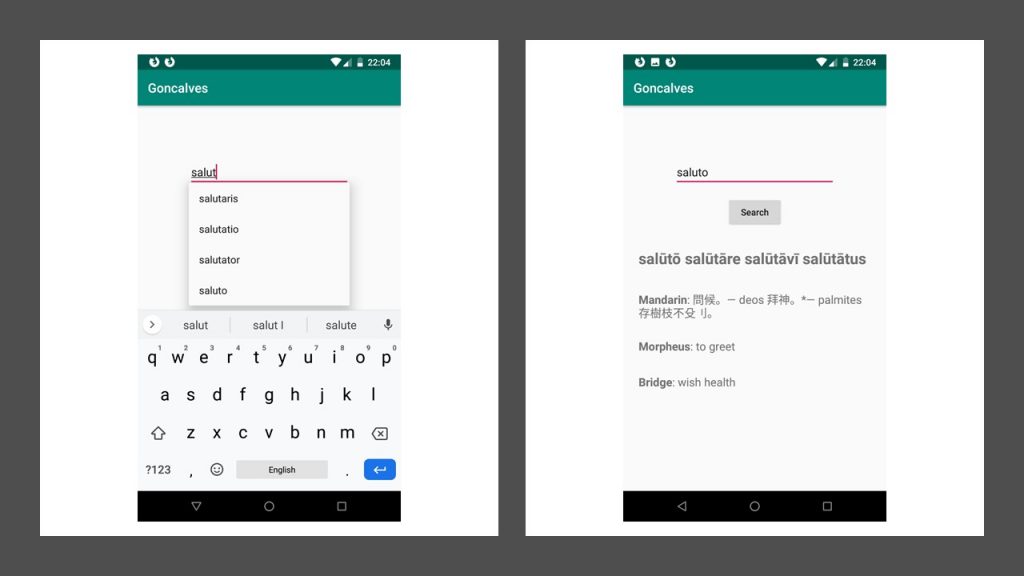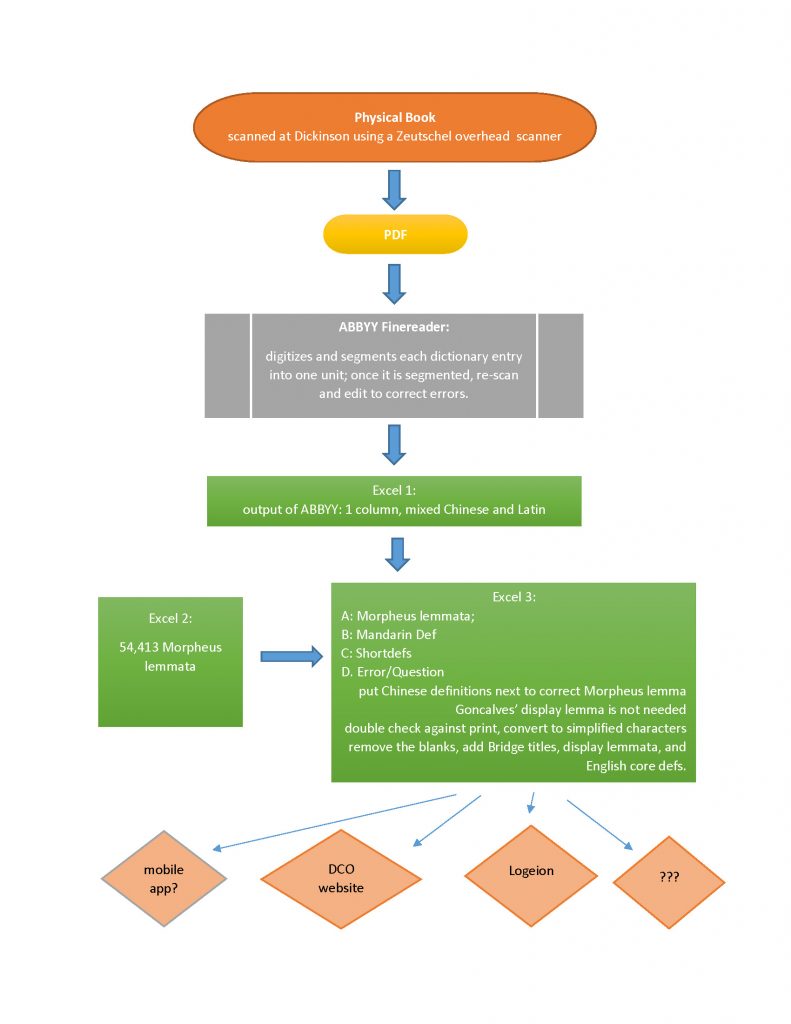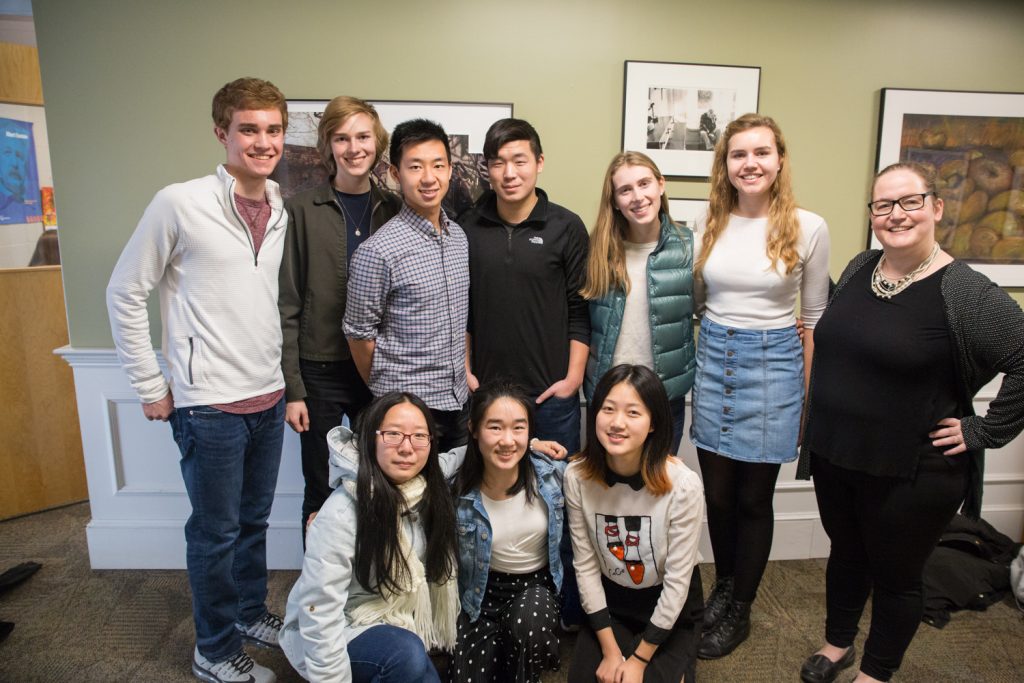I’ve been working with others for several years now to digitize a large Latin-Chinese dictionary, but I realized that I have never blogged about the effort and publicly recognized the people involved. I just got back from China, where I discussed the project at a colloquium in Beijing, and work will intensify this summer, so now seems like a good a time as any to let people know about this exciting project.
 The goal is to create a large Latin-Chinese dictionary as standalone mobile application and as a database freely available on the website Dickinson Classics Online, which collects resources for Chinese readers of Greek and Latin texts. The source of the dictionary data is the Lexicon Magnum Latino-Sinicum of Joaquim Affonso Gonçalves, first published in 1841. The author was a Portuguese Jesuit professor working with Chinese collaborators in Macau. No similar resource exists, and the increasing numbers of students of Latin in China have little access to the books and references resources familiar to students in the West. The overall goal of the DCO project of which this is a part is to globalize the study of classical texts and the pre-modern humanities.
The goal is to create a large Latin-Chinese dictionary as standalone mobile application and as a database freely available on the website Dickinson Classics Online, which collects resources for Chinese readers of Greek and Latin texts. The source of the dictionary data is the Lexicon Magnum Latino-Sinicum of Joaquim Affonso Gonçalves, first published in 1841. The author was a Portuguese Jesuit professor working with Chinese collaborators in Macau. No similar resource exists, and the increasing numbers of students of Latin in China have little access to the books and references resources familiar to students in the West. The overall goal of the DCO project of which this is a part is to globalize the study of classical texts and the pre-modern humanities.

A sample showing Gancalves’ distinctive lemmatizations
Work Already Done
- The book itself is very rare. In 2016 Don Sailer and the staff at the Waidner-Spahr Library at Dickinson photographed a borrowed copy (thank you, Princeton libraries. They had one of the three existing copies of the last edition, and it was checked out at the time!). In 2016-17 Dickinson students Siyun Yan and Seth Levin ran the scans through the text recognition program ABBYY, hand-corrected and created an Excel spreadsheet of the result.

Dickinson Students Siyun Yan and Seth Levin carried out initial editing of the ABBYY output.
- Seth Levin began coordinating Goncalves’ headwords with the large list of Latin dictionary headwords known as Morpheus, used in the Perseus Project. The purpose of this was to make it easier to share and coordinate the data with other large Latin dictionaries, like those available on Logeion. At the same time the headwords were coordinated with the lemma list of The Bridge, a dictionary application created by Bret Mulligan that can create custom vocabulary lists for classical texts. The Bridge list largely overlaps with the Morpheus list, but includes some better definitions and “display lemmas,” the full forms of the dictionary headwords.

correcting ABBYY output

Corrected output from ABBYY: single column

Combinng Goncalves’ definitions with Morpheus lemmata and shortdefs

lemmatization problems
- In 2017 Qizhen Xie, a classics graduate student at the University of New Hampshire, continued the editing of the Chinese and the Latin headwords, and made considerable headway on this very large set of lemmas.

- English definitions and display lemmas for most items were added from the Morpheus and Bridge data sets. As part of the digitization I made the decision not to preserve Goncalves’ display lemmas, since they are idiosyncratic.
- In spring 2019 Eli Goings (Dickinson ’18) and I worked on adding missing display lemmas and English definitions for words that are in Goncalves but not in the Morpheus list, or for which the Morpheus display lemmas are inadequate.
- Most recently, developer Lara Frymark (Dickinson ’12) created the Android mobile application that will carry the data, and Ryan Burke, our Dickinson Drupal specialist (without whom DCC and DCO could not exist) created a content type for it on DCO.

DCO sample

Android mobile app screenshot
Work Remaining
- This summer we plan to finish creation of missing display lemmas. These number in the several thousands. They need to be created in a specific standard format, used in the Bridge, based on information in Gonçalves’ book itself, and added to the Excel spreadsheet. There will also be proof-reading to be done.
- If time allows, edit and improve the Morpheus English definitions, which are often missing or faulty.

Gonçalves digitization workflow chart
For those who are interested, here is some English bibliography about western classics in China, and details about Gonçalves’ work.
Western Classics in China
Bartsch, Shadi. “The Ancient Greeks in Modern China: Interpretation and Metamorphosis.” In The Reception of Greek and Roman Culture in East Asia: Texts & Artefacts, Institutions & Practices, ed. A-B. Renger. Forthcoming from Brill. Pre-print available on Academia.edu.
Coleman, Kathleen. “Nondum Arabes Seresque Rogant: Classics Looks East.” Society for Classical Studies Blog, October 16, 2016. https://classicalstudies.org/scs-blog/kcoleman/blog-nondum-arabes-seresque-rogant-classics-looks-east
Li, Yongyi, “A New Incarnation for Latin in China.” Amphora, October 4, 2014. https://classicalstudies.org/amphora/new-incarnation-latin-china-yongyi-li
Liu, Jinyu. “Virgil in China in the Twentieth Century.” Sino-American Journal of Comparative Literature I (2015): 67–105. Available on Academia.edu.
Goncalves, Macau, and Missionary Scholarship
Gonçalves, Joaquim Affonso. Vocabularium latino-sinicum: pronuntiatione mandarina latinis literis expressa. Macao: A Lauriano Hippolyto typis mandatum, 1836. 246 pages; 17 cm. Repr. 1886. 246 p.; 17 cm. (OCLC: 419787323)
. Lexicon manuale latino sinicum continens omnia vocabula latina utilia et primitiva, etiam Scripturae Sacrae. Macai, in Collegio S. Joseph ab E. Rosa typis mandatum, 1839. ii-vii, 498 pages, 23 cm (OCLC: 7482643). Available on Hathi Trust and Google Books. Approximately 10,500 lemmas. 6th ed. Pekini: Typis Lazaristarum, 1937. viii, 446 pages ; 22 cm.
. Lexicon magnum latino-sinicum ostendens etymologiam, prosodiam, et constructionem vocabulorum. Macai, in Collegio sancti Joseph. ab E. Rosa typis mandatum, 1841. (OCLC: 39488723). iv, 779 pages 32 cm. Available on Google Books. 3rd edition, Pekini: Typis Congregationis Missionis, 1892 (OCLC: 663670553). Repr. 1936 (OCLC: 42878372).
Lach, Donald. Asia in the Making of Europe, vol. II: A Century of Wonder. Book 3: The Scholarly Disciplines. Chicago: University of Chicago Press, 2010.
Tang, Kaijian. Setting off from Macau: Essays on Jesuit History during the Ming and Qing Dynasties. Leiden: Brill, 2016. Ch. 2: “Macau and the Spread of Catholicism in Mainland China during the Late Ming and Early Qing Dynasties.”
Tiedemann, R.G. Handbook of Christianity in China. Leiden: Brill, 2010.

